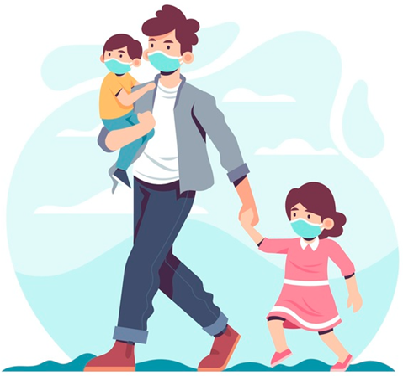With the second wave of Covid-19 playing havoc in people’s lives, the fear, stress, and pain, together are giving a tough time to everyone, especially the small children and teenagers. The struggle with the disease and the numerous losses of lives has been very disturbing for kids to cope with it emotionally.

As per a survey done by WHO, it is found that despite increasing demands, the Covid-19 pandemic has interrupted the critical mental health services in 93 % of countries globally. Even in India, the situation is no different, especially in the case of children.
The pandemic and the subsequent lockdown in almost every state of the country, and the insecurity involved with it have had a profound impact on the mental health and well-being of kids in India.
There has been a four-fold increase in anxiety and depressive symptoms among children, especially after the start of the pandemic in many countries including India. Adolescents and children are exhibiting emotional distress, suicidal thoughts, and behaviours.
With disruptions in their daily rituals of going to school, spending time in the playground with peers, learning hobbies, etc. paused by the lockdown, the emotional stability of kids has become a prerequisite. Since children are sensitive and vulnerable, they are facing a greater challenge in dealing with the circumstances, especially those who have lost someone close to this disease.
All this is affecting the mental health of kids and they are falling into the trap of stress, depression, and hopelessness. In many cases, parents or caretakers are not even aware of the mental trauma that the kids are going through. Here we are listing out some of the common symptoms that might help them recognize signs of stress in their children or to know their mental health.
Common symptoms to know about a child’s mental health
- the child gets irritated more often
- there is a change in behaviour and mood swings
- frequent conflicts with people around
- loss of interest in things or activities that they used to love previously
- loss of interest in people around them or personal relationships
- finding it difficult to fall asleep or sleeping through most of the day
- changes in eating habits or appetite, either not eating or eating most of the time
- finding it difficult to concentrate
- loss of interest in academics
- increased chances of falling into the trap of bad company
- talking more about death
How to deal if a child is mentally disturbed
The disruptions in our daily lives caused by the pandemic are making children too stressed out, thereby affecting their mental health. In such a situation, the things that the kids need most from their parents and elders are love and care. Communicating with the child is very important so that he/she can talk about his/her feelings. Talking about how they feel – depressed, hopeless, or nervous – might give signs for elders to understand that they need more support during such times. Teenagers are likely to hide their feelings due to shame, fear, etc., whereas small kids may not understand how to explain their thoughts, but might portray changes in their behaviour. So being alert is required for parents and elders to understand the mental state of their kids.
When is the right time to reach out to a counsellor?
The current situation caused by the pandemic might lead to confusion, frustration, and anxiety among children. Some parents or elders might find it difficult to explain and communicate about the situation to their kids to soothe their mental health. And this might lead to further deterioration of the situation and increased frustration. Thus, in such a case, it is better to seek help from a counsellor who could soothe your kids and help them relieve the mental stress and depression they are going through. Here, parents can seek online counselling for their kids to stay safe during the pandemic. There are many options available for parents to seek aid/counselling for their kids. With your care, support, and child counselling, you can ensure mental health for your children.

